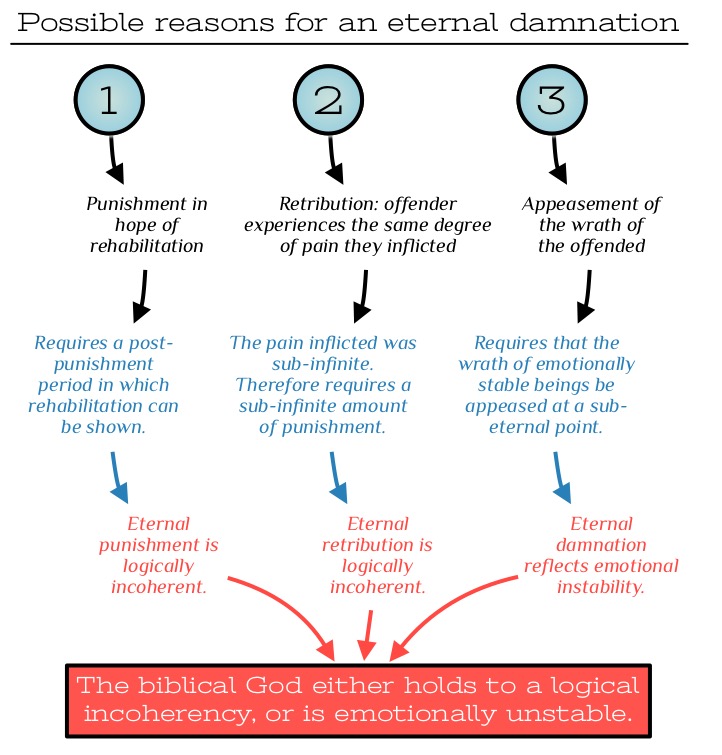 Imagine you have a daughter you deeply love, but she just won’t respect your household rules, rules made in her best interests. So you lock her in the basement where there is only darkness and cold concrete. After two years, your neighbor Andy wanders by and asks where your daughter has been. You explain you had to lock her in the basement to be punishment since she did not respect your rules. Andy asks when she will be released from the basement. You explain she can never be released since the rules you made require that she spend eternity in the basement. Andy acts surprised. “I thought you loved her” he says. “I do” you assure him. But She is being punished.” Andy asks “How can this be punishment when there is no possibility of her learning from her punishment and living a normal life?” You calmly explain that she had broken the rules, and breaking the rules requires eternal punishment. “But I thought you made the rules out of love for her and hope for her future! What broken rule would require her eternal torment in the basement?” You respond “She merely told a lie, but all my rules require eternal torment if broken”. Andy stares at you in disbelief. “Are you sure you know what love is? Do you know the purpose of punishment?” You are now a bit irritated. “Of course I know what punishment is for. It is to appease my wrath. I clearly love her. It’s just that her rebellion hurt me. My wrath must be appeased, and it takes nothing less than eternal torment for my wrath to be appeased.” Do you actually love your daughter? Are you just? You determined the rules. Could you not then simply forgive your daughter? Is eternity in the basement equivalent to any pain you daughter caused you? Are you emotionally stable? For any alleged God acting this way, should we not ask these same questions?
Imagine you have a daughter you deeply love, but she just won’t respect your household rules, rules made in her best interests. So you lock her in the basement where there is only darkness and cold concrete. After two years, your neighbor Andy wanders by and asks where your daughter has been. You explain you had to lock her in the basement to be punishment since she did not respect your rules. Andy asks when she will be released from the basement. You explain she can never be released since the rules you made require that she spend eternity in the basement. Andy acts surprised. “I thought you loved her” he says. “I do” you assure him. But She is being punished.” Andy asks “How can this be punishment when there is no possibility of her learning from her punishment and living a normal life?” You calmly explain that she had broken the rules, and breaking the rules requires eternal punishment. “But I thought you made the rules out of love for her and hope for her future! What broken rule would require her eternal torment in the basement?” You respond “She merely told a lie, but all my rules require eternal torment if broken”. Andy stares at you in disbelief. “Are you sure you know what love is? Do you know the purpose of punishment?” You are now a bit irritated. “Of course I know what punishment is for. It is to appease my wrath. I clearly love her. It’s just that her rebellion hurt me. My wrath must be appeased, and it takes nothing less than eternal torment for my wrath to be appeased.” Do you actually love your daughter? Are you just? You determined the rules. Could you not then simply forgive your daughter? Is eternity in the basement equivalent to any pain you daughter caused you? Are you emotionally stable? For any alleged God acting this way, should we not ask these same questions?
This chapter applies to only those Christians who believe damnation is eternal. It is clear that punishment by a loving authority, whether that be parents or a God, will be applied with the hope of rehabilitation. Where there is no available period after the period of punishment in which to live out rehabilitation, there is no true punishment. This reflects the essence of P1 and P2 in our syllogism above. Just retribution is by definition the infliction of the same degree of pain and suffering on the offender that was inflicted by the offender. Since all pain and suffering in this life is not eternal, and therefore not infinite, just retribution for offenses in this life can not be eternal. The necessary equivalency fails. This reflects the essence of P3 in our syllogism above. Have you ever met an emotionally healthy human whose wrath for an offense could not be pacified? Do you think an actual God of the universe would be so emotionally incontinent? This is the essence of P4 in our syllogism above.
ADDITIONAL NOTES:
A more visual representation of the issue is shown below.
This critique of these three possible reasons for eternal damnation does not include the incoherency of a loving God unable to forgive without bloodshed. This is address in #33.
The Bible never admits that vengeance is unjust and unbecoming of emotionally healthy individuals. It instead only tells us to keep our vengeful spirits in check, and to allow the vengeful Christian God to do the avenging.
Do not take revenge, my dear friends, but leave room for God’s wrath, for it is written: “It is mine to avenge; I will repay,” says the Lord. (Romans 12:19)
Does this sound like an emotionally healthy God? Would you respect a father who told his daughter not to respond to the bullying of her brother, only so that he could himself eternally torment the brother? Could any God who did likewise call himself loving and just?

